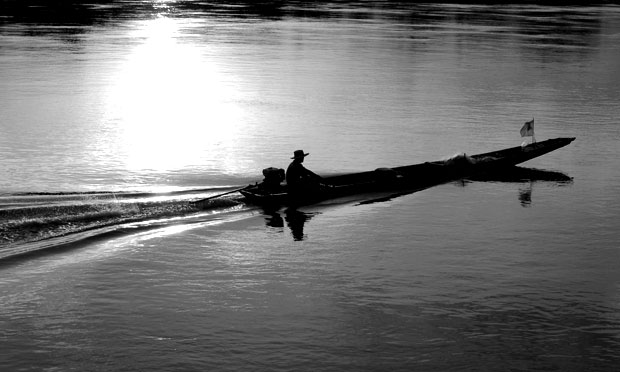Everyday Humanitarians

To be a humanitarian, you don’t need to pull a child from a burning taxi cab, work in a room ridden with bullet holes or run for your life while being chased by hyenas.
You start at home, in your own community. You act, instead of talk.
You do little things to help people.
Lith Bounphasith is a great example.
He’s a quiet father of three who serves his community by using his gift for navigating rushing water.
His tiny village teeters on a cliffside in mountainous northern Laos. It is home to some 600 people.
Here, the river means life.
It’s waters offer food – fish and fresh-water crabs are a staple to villagers’ diet.
But it’s more than that.
It’s a place to catch-up with a neighbour – every evening, just after the sun hides itself behind the mountain, villagers pour to the river’s waters to bathe, stopping to chat with their neighbours along the way, learning about the day’s events or getting filled in on local gossip.
And it’s a place to play – where children splash after the final school bell rings, learning to swim at a young age.
For many centuries, this village, and a dozen or so others located along the riverbank, has been impenetrable. The mountains here are too steep, the jungle too thick. The only way in has been by boat.
Lith knows this snake-shaped waterways better than most.
He’s propelled his long canoe through it’s gentle flow during the dry season, avoiding the hidden rocks lurking below the surface. He’s forged through the river’s mighty rage during rainy season, where the river triples or quadruples and the water rushes wildly.
So what makes him a humanitarian?
Lith is like many fathers in his village.
He was born to a poor family, didn’t finish primary school and started working before he was old enough to grow hair on his chin.
But when World Vision started operating in this community eight years ago, Lith gave up his trade. He began focusing on helping people, the people who were in need in his own communities and 31 nearby villages.
Today, he is helping nearly 2,000 children enrolled in the sponsorship programme improve their lives.
Recently we caught up with him.
Here’s an excerpt of the interview:
How did you learn to drive a boat?
“I was born beside the river, I learned from my parents when I was a little boy.
“My father and grandfather were boat builders and merchants too. So I learned at a young age, as a small child.
“When I was still a young boy, we were very poor, I couldn’t buy even a motorbike.
"So I went to the jungle and cut down a big tree to make a boat by myself.”
What do you love about driving a boat?
“Driving a boat will get a lot of duties and you can do a lot of different jobs.
“In the past, when I was a merchant. I travelled up and down the river, buying and selling rice, buying and selling buffalos, cows and goats.”
How do you get a buffalo or cow in a small boat?
“You need a lot of people to help. When the animal is on, they have to lay down and you have to tie their legs.
“Now, [with World Vision], I am moving ducks, goats and rice, school construction materials, water supply materials to the villages.
“Goats they’re easy to put on the boat, we tie their legs so they can’t move and they lay down. I really enjoyed bringing the hundreds of goats to the villages.”
Why did you apply to work with World Vision?
“In the past there were no roads, you only travelled by the river. I was really good at driving the boat and they [World Vision] really needed a person who could drive a boat, so I applied.”
What do you think about the organization and what it does?
“I am really happy to help the community and to make people’s livelihoods better.”
How do you do that?
“The first time I did something to help, I brought a lady in a village where World Vision was working who was feeling sick to the hospital by boat. There were no roads at that time, so we brought the lady to the hospital.
“Then, another time, I brought a teacher who was sick to the hospital.
“Over the years, it’s not only adults, but many children as well. A lot.”
What’s your dream for your children?
“My goal is for my three children to is for them to finish school, and to get a job.
“While my oldest son can do it too now - he can drive the boat, he can go and fish with the boat - the generations of boat drivers will likely end with me.”
What’s your dream for the children of Pakxeng?
“The children here should all finish school, have jobs, be able to speak another language - like English - and can opportunities to travel overseas.”


